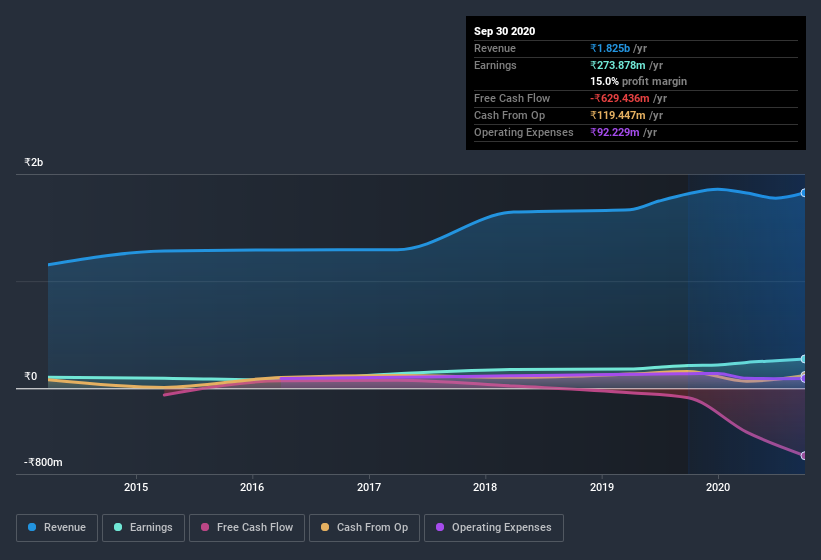Should You Rely On Dynemic Products's (NSE:DYNPRO) Earnings Growth?
Statistically speaking, it is less risky to invest in profitable companies than in unprofitable ones. That said, the current statutory profit is not always a good guide to a company's underlying profitability. This article will consider whether Dynemic Products' (NSE:DYNPRO) statutory profits are a good guide to its underlying earnings.
We like the fact that Dynemic Products made a profit of ₹273.9m on its revenue of ₹1.82b, in the last year. In the chart below, you can see that its profit and revenue have both grown over the last three years.
View our latest analysis for Dynemic Products

Not all profits are equal, and we can learn more about the nature of a company's past profitability by diving deeper into the financial statements. So today we'll look at what Dynemic Products' cashflow tells us about the quality of its earnings. Note: we always recommend investors check balance sheet strength. Click here to be taken to our balance sheet analysis of Dynemic Products.
Examining Cashflow Against Dynemic Products' Earnings
Many investors haven't heard of the accrual ratio from cashflow, but it is actually a useful measure of how well a company's profit is backed up by free cash flow (FCF) during a given period. The accrual ratio subtracts the FCF from the profit for a given period, and divides the result by the average operating assets of the company over that time. The ratio shows us how much a company's profit exceeds its FCF.
That means a negative accrual ratio is a good thing, because it shows that the company is bringing in more free cash flow than its profit would suggest. While it's not a problem to have a positive accrual ratio, indicating a certain level of non-cash profits, a high accrual ratio is arguably a bad thing, because it indicates paper profits are not matched by cash flow. That's because some academic studies have suggested that high accruals ratios tend to lead to lower profit or less profit growth.
Dynemic Products has an accrual ratio of 0.47 for the year to September 2020. As a general rule, that bodes poorly for future profitability. And indeed, during the period the company didn't produce any free cash flow whatsoever. Even though it reported a profit of ₹273.9m, a look at free cash flow indicates it actually burnt through ₹629m in the last year. Coming off the back of negative free cash flow last year, we imagine some shareholders might wonder if its cash burn of ₹629m, this year, indicates high risk.
Our Take On Dynemic Products' Profit Performance
As we discussed above, we think Dynemic Products' earnings were not supported by free cash flow, which might concern some investors. For this reason, we think that Dynemic Products' statutory profits may be a bad guide to its underlying earnings power, and might give investors an overly positive impression of the company. But the good news is that its EPS growth over the last three years has been very impressive. At the end of the day, it's essential to consider more than just the factors above, if you want to understand the company properly. So if you'd like to dive deeper into this stock, it's crucial to consider any risks it's facing. When we did our research, we found 5 warning signs for Dynemic Products (2 don't sit too well with us!) that we believe deserve your full attention.
This note has only looked at a single factor that sheds light on the nature of Dynemic Products' profit. But there are plenty of other ways to inform your opinion of a company. For example, many people consider a high return on equity as an indication of favorable business economics, while others like to 'follow the money' and search out stocks that insiders are buying. While it might take a little research on your behalf, you may find this free collection of companies boasting high return on equity, or this list of stocks that insiders are buying to be useful.
When trading Dynemic Products or any other investment, use the platform considered by many to be the Professional's Gateway to the Worlds Market, Interactive Brokers. You get the lowest-cost* trading on stocks, options, futures, forex, bonds and funds worldwide from a single integrated account. Promoted
New: Manage All Your Stock Portfolios in One Place
We've created the ultimate portfolio companion for stock investors, and it's free.
• Connect an unlimited number of Portfolios and see your total in one currency
• Be alerted to new Warning Signs or Risks via email or mobile
• Track the Fair Value of your stocks
This article by Simply Wall St is general in nature. It does not constitute a recommendation to buy or sell any stock, and does not take account of your objectives, or your financial situation. We aim to bring you long-term focused analysis driven by fundamental data. Note that our analysis may not factor in the latest price-sensitive company announcements or qualitative material. Simply Wall St has no position in any stocks mentioned.
*Interactive Brokers Rated Lowest Cost Broker by StockBrokers.com Annual Online Review 2020
Have feedback on this article? Concerned about the content? Get in touch with us directly. Alternatively, email editorial-team@simplywallst.com.
About NSEI:DYNPRO
Dynemic Products
Engages in the manufacture and sale of dyes and dye intermediates in India.
Proven track record with adequate balance sheet.
Market Insights
Community Narratives



